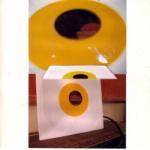
Guided By Voices Let's Go Eat The Factory
(Fire)
Rumors had been rife for some time, among those who care about such things, of a Guided By Voices reunion. In 2010 main man Robert Pollard gathered together what is generally regarded as the band’s finest line-up – the mid 1990s roster of Pollard, Sprout, Demos, Mitchell and Fennell – for a tour, and I guess the temptation to record some new material with his old drinkin’ buddies was too great to resist. I have to say I’m glad he couldn’t resist, as Let’s Go Eat The Factory is, to use a clichéd phrase, a great big “Return To Form”; the form in question being that of albums from 15-odd years ago such as Alien Lanes and Bee Thousand. All the trademark traits of those albums are present: the wilful eclecticism; the ramshackle, chucked together feel; the brevity of the songs; the weird juxtaposed with the trad. It’s all here, and most of it is pretty good.
Track one of 21 is Laundry And Lasers, a driving powerhouse of a song that emerges from guitar drone into a star-strafing boogie calling to mind Stereolab at their noisiest. At two minutes, 38 seconds it’s over in a flash – I’d have loved it to go on for another two minutes – but such is the band’s modus operandum. The Head continues the ‘Lab chug but where that band were/are all about extending that vibe all the way to the far horizon, here it’s cut short at a minute and 10. Doughnut For A Snowman is REM-esque with Pollard’s acute understanding of melody tied to inscrutable lyrics and jangling guitar. Spiderfighter is one of the album’s more intriguing offerings, with spidery guitar lines and angular riffs morphing into a piano and falsetto coda that could be Mercury Rev. The choice for lead single The Unsinkable Fats Domino is a breezy power-pop number with great vocal harmonizing in the chorus. By the time we get to track number nine, The Big Hat And Toy Show, we’re getting used to the album’s feel and vibe. But this track is a confounder. With extemporized wah-wah guitar and fx, a moody bass line and a vocal that recalls the spirit of Beefheart, it’s a cat among pigeons. Imperial Racehorsing has a trumpet and brass section thrown into the mix to stir things up – with the result being almost Beatlesy. God, we’re 10 tracks in and not even half way through the album.
Highlights of the second half are Waves, which sounds like Stereolab (again) covering 154 era Wire; My Europa, a shimmering guitar fragment with a wistful, longing vocal; and finally the longest track here, and also one of the strongest, the epic (at 4 minutes) closer We Won’t Apologize For The Human Race, a stately-paced chugger that features a vocal strangely reminiscent of mid 1970s Peter Gabriel. What unites this disparate collection of songs, fragments and oddities is a singularity of vision attributable to the band as a whole but Pollard in particular. Nearly all of these songs are but one idea performed once, and then it’s on to the next one. This singular aesthetic makes GBV a kind of anti-Radiohead. That band took the (indie)rock template as far as it could go with OK Computer and in the process invoked the sprit (if not the musical chops) of Prog, then spent the ensuing decade and a bit renegotiating their sound with varying degrees of success. GBV on the other hand know what they’re good at, and they’re good at doing it.
Let’s Go Eat The Factory isn’t an Alien Lanes: a few of these songs are less than one idea – like something you find in your pocket after a night out and discard. In 15 years time it probably won’t be remembered as a great album of its kind. But their voice as a band is still a unique one, and it sets them apart from their peers now, just as it did in the 1990s. Its antecedents and influences are clear for all to hear – from The Beatles, through Beefheart, Pere Ubu and Wire, to REM and Pixies – but in combining these with a leftfield aesthetic and a commitment to brevity they sound like no-one but themselves. Some come-backs are fraught with danger, both commercial and artistic. This one is entirely justified. Welcome back, guys.
5 January, 2012 - 10:33 — David John Wood